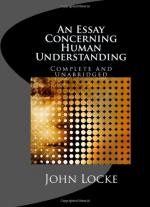|
This section contains 762 words (approx. 2 pages at 400 words per page) |

|
Empiricism
One of the key themes of this work is the defense and articulation of an empiricist theory of knowledge. Although Hobbes had previously developed something like an empiricist theory of knowledge, his theory, though brilliant, is idiosyncratic. Locke is properly seen as the father of modern empiricism, the approach to philosophy followed by Hume, Berkeley, Mill, Ayer, Quine and many other philosophers up until the present day. Indeed, some form of empiricism is the dominant approach to philosophy in the English-speaking world. Locke's approach is developed in this Essay.
Empiricism is first and foremost a doctrine about where knowledge comes from. Knowledge, the empiricist claims, derives ultimately from experience. Many, like Locke and Hume argue that all knowledge basically comes from experience, though some empiricists may allow for the existence of a priori knowledge or knowledge that is not derived from experience.
Locke is extremely radical in this...
|
This section contains 762 words (approx. 2 pages at 400 words per page) |

|




